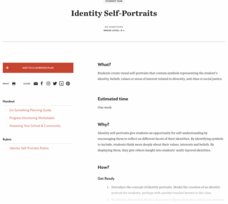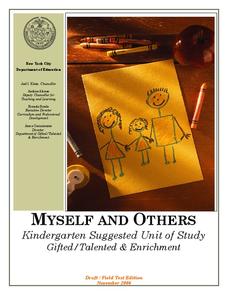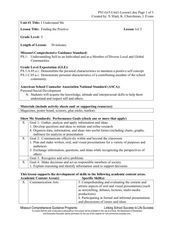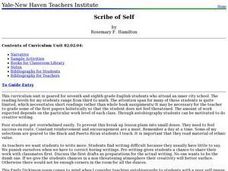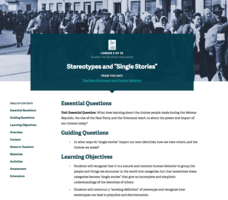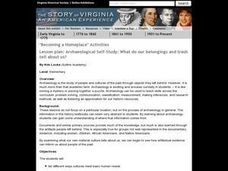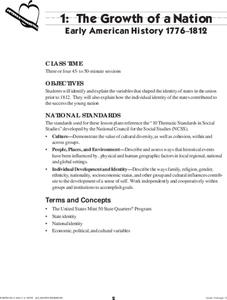Anti-Defamation League
Identity-Based Bullying
What is identity? What is bullying? What is identity-based bullying? After discussing these questions as a class, pupils engage in partner discussions before participating in a small group activity to act out bullying scenarios. Then,...
Teaching Tolerance
Identity Self-Portraits
What symbols represent you best? Individuals consider how they would draw peers using symbols about their identities with an interview and art activity. After conducting interviews and portraits, the art makes a great centerpiece for...
Facing History and Ourselves
Unit Assessment: From Identity to Action
Four projects enable class members to show what they have learned about ways they can stand up for democracy. to begin, individuals review their identity charts and craft a mask that represents themselves. Next, groups create a short,...
New York City Department of Education
Myself and Others
Self reflection is an important skill to reinforce in our children, and it's especially helpful to help them realize who they are in the context of their environment. A collection of lessons about self image and community encourage...
Curated OER
Finding the Positive
Fifth graders meet the "Famous Artist." They are introduced to the topic of self-concept. Students work in small groups and get organized to create collages. They create a collage that represents characteristics of positive self-concept.
Facing History and Ourselves
What's In a Name?
Rumpelstiltskin understood the power of names. The second lesson in the First Days of School series focuses on building community by recognizing the importance of the relationships among names, identities, and cultures. Learners engage...
Facing History and Ourselves
Many Voices, One National Identity
To conclude the unit on "Exploring Identity in the United States," pupils consider whether it is possible to combine many voices into one national identity. After creating an identity chart that lists words, phrases, and images that they...
Anti-Defamation League
Emojis and Me
A instructional activity features the work of O'Plérou Grebet, a graphic designer who created a collection of emojis to represent his life in West Africa. Scholars explore the history and purpose of emojis, then read and discuss an...
Facing History and Ourselves
Our Names and Our Place in the World
Names come with all sorts of nuances and can influence how we see ourselves and how others see us. To gain insight into the power of names, class members journal about their names and then read a short essay about a girl and her feelings...
Curated OER
Building Bridges for Young Learners - Self
Young scholars explore self analysis by investigating other cultures. In this personal characteristics instructional activity, students utilize the Internet to read about a child from Niger, and many other young scholars around the...
Curated OER
Scribe of Self
Seventh graders read "Diary of a Young Girl" by Anne Frank. In groups, they discuss the reasons why people would write an autobiography and identify their own identity crisis. After reading excerpts of other autobiographies, they...
Facing History and Ourselves
Dual Identities
Many of us have multiple identities. There's who we are at home, school, friends, and strangers. And often these identities come with different names. The third activity in the First Days of School series examines how names reflect...
Curated OER
Identity: A Path to Self-Esteem
Sixth graders participate in a brainstorming activity in which they identify the types of decisions they make everyday. Individually, they complete a worksheet on making decisions effectively. After reading a poem, they identify the...
Curated OER
Identity, Belonging, and Social Inclusion
Learners explore personal and social identity. In this character education lesson, students create identity profiles and design welcome plans for their school community in order to build personal and community identities.
Idaho Coalition
The Hunger Games: Gender Empowerment
The odds are in your favor that your pupils will love this lesson that uses The Hunger Games to launch a study of gender empowerment, as well as the influence of social constructs of gender. Groups discuss how Katniss Everdeen and Peeta...
Curated OER
Making Choices
Fifth graders identify their personal interests and behavioral choices. They explore how these choices affect school and family situations. Consequences of their choices are examined.
Curated OER
In Search of Self: Adolescent Themes in the Twentieth Century Short Story
Students read short stories that are related to adolescent issues and behaviors. In groups, they review the elements of a short story and vocabulary they might need while reading. To end the lesson, they read "Sir Tatton Sykes"...
Facing History and Ourselves
Stereotypes and “Single Stories”
Help bring subconscious stereotypes to the surface to stop it in its tracks. Pupils first read an excerpt describing the experience of prejudice and analyze how this process connects to World War II. Then, they write a creative story...
Curated OER
Discovering Why I Am Who I Am
Young scholars analyze their family history and traditions. In this family history lesson plan, students identify family members to research and interview their family about the people. Young scholars write their family histories and...
Curated OER
It's All About Me
Students engage in a variety of activities to develop the skills they need to answer questions about themselves. They respond to questions relating to their ages, names and favorite colors.
Curated OER
Archaeological Self-Study: What Do Our Belongings and Trash Tell About Us?
Students examine how their belongings and their trash represents who they are. In this archaeology skills lesson, students watch a video titled "Discovering the Past" and then give archaeological techniques a try. Students examine and...
US Mint
The Growth of a Nation
Young historians explore the identity of the early United States in this four-part instructional activity series. Working in groups of three, students research the political, economic, and cultural atmosphere of each...
US Institute of Peace
Identifying Conflict Styles
Are you a peace-keeper or a problem-solver? Explore conflict management styles through a lesson, fourth in a 15-part series, that combines individual assessment and collaborative work. Groups learn the basic tendencies of each style,...
American Psychological Association
Developing Adolescents
Why to young people act the way they do? Scholars investigate the stages of adolescent development incorporating high school psychology techniques. Using research from the American Psychological Association, they uncover the five areas...

